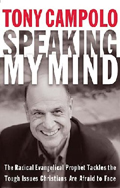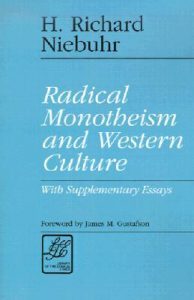
Speaking My Mind. By Tony Campolo. Nashville: Thomas Nelson, 2004. 239 pages.
Tony Campolo, renowned evangelical speaker and prolific writer, maintains in Speaking My Mind what he has been convicted of his whole adult life: That the gospel commitment of a Christian is to a life lived in accordance with the divine authority of Scripture, in relationship with the living Jesus Christ, and in assurance of a resurrection and a life everlasting. Speaking My Mind, however, is not written as a tool for spreading his gospel message to the un-evangelized. It is written to the evangelical community out of a deep concern for what Campolo believes evangelical Christianity has become in America. The evangelical community, says Campolo, despite its growing popularity and marketing success, may harbor “within itself the seeds of its own destruction” (24). It has handled issues like women’s ordination, homosexuality, poverty, politics, and Islam in ways which not only threaten the survival of the evangelical community but which compromise and pervert the heart of the Biblical message. In what may be a surprising juxtaposition of ideas for many readers familiar with evangelicalism, Campolo offers a socially and politically liberal message informed by theologically conservative convictions. For those living comfortably within the evangelical community in America, the book may shake those places in which they feel secure; for those about to give up on the prophetic possibilities and gospel commitment of evangelicalism, however, Campolo offers inspiration and hope.
Part One of Speaking My Mind describes the position within American society which evangelicalism currently occupies, especially in relation to mainline Christian denominations. It also acts as an introduction as to why Campolo felt compelled to write what follows in Part Two. “We evangelicals may have been wrong on some crucial social issues,” he says, “[and] I believe that our credibility depends upon our being honest about our mistakes and open to new perspectives” (27). Part Two begins, then, with the question of sexism and the controversial issue of the ordination of women within evangelical denominations. His commentary on the issue sets the tone for the rest of the book in which Campolo continually argues against mainstream evangelical rhetoric in favor, rather, of a Biblically-grounded ethic. But the question about women’s identity in the church (and home) seems also, among the other controversial issues in the book, the issue he is least ambivalent about. Campolo is unequivocal about his belief that women have been oppressed by the church in the past, have every right to be ordained, and need to be ordained for the sake of the health and wholeness of the church. “Those who [prevent] women from being ordained to the preaching ministry [are] perpetuating an evil practice,” (33) he says. Evil, he admits, is a strong word. Nevertheless, he maintains his stance throughout the chapter, using personal experience and a thorough analysis of Scripture to ground his convictions.
Following his analysis of sexism within evangelicalism, Campolo shares with his readers what he believes needs to be the evangelical stance on other controversial social issues such as homosexuality, relationship with Islam, poverty and politics. As for homosexuality, insists Campolo, there needs to be a distinction made between orientation and behavior. Arguing, again, from the perspectives of personal reflection, careful Scriptural analysis, and years of research, Campolo believes that homosexual orientation is not chosen by a person; behavior, he counters, is. Because of this, Campolo begs churches and evangelical Christians to affirm and stand beside their gay and lesbian brothers and sisters as members of one body in Christ. While he believes that the most Biblically honorable way to live as a homosexual is to remain celibate, he encourages churches and individual Christians to continue in dialogue on this issue as he acknowledges that other Christians (including his own wife) believe that a committed monogamous homosexual relationship is equally appropriate before God.
Beyond homosexuality and women’s issues, Campolo is equally critical of the way that the majority of evangelicals have recently treated political issues, poverty issues, and relationships with Islam. The Bible, Campolo reminds his audience, asks children of God to act prophetically on behalf of their nation, not to unquestioningly support political parties; it furthermore commands followers of Christ to concern themselves foremost with the needs of the poor, and to return violence with peace. Republican decisions of the Bush era, on the other hand, he describes in detail, have not only taken billions of necessary dollars away from essential services for the poor but have simultaneously increased security risks for the United States by provoking hatred. Moreover, says Campolo, these recent decisions have also hindered the spread of the gospel by advertising Christianity as a vehicle of warfare rather than a message of transforming peace.
Throughout his heartfelt pleas for the repentance of evangelicals and for a renewed commitment towards justice and a love of one’s neighbor, Campolo remains committed in his book to a theologically conservative position: he believes “in the supernatural as the vital element in the revelation and operation of the Christian faith,” (223) believes in the reality of hell, believes there are dire consequences “for those who reject the pleas of Christ to love Him and to give themselves to Him,” (91) and believes Scripture to be an inerrant guide “for faith and for living out the Christian life” (231). However, in what is arguably his most illuminating reflection on evangelicalism, he critically undermines one theological position common for many evangelicals: dispensationalism.
“It is hard to understand what is going on in evangelicalism without having some understanding of [dispensationalism],” says Campolo; and it is not an exaggeration, he continues, to say “that dispensationalism has become a major force in molding American domestic and foreign policies” (207). The theory of dispensationalism splits up the history of the world into distinct plans of salvation. The current period in which we are now living, the theory goes, is the dispensation of grace. Within this period of grace, explains Campolo, dispensationalists further split up the history of the church into seven stages. Today’s church, of course, as anyone involved in a dispensationalist community or simply attuned to popular culture knows, is in the last stage of church history: These are “the last days leading up to the coming of Christ” (209) and the battle of Armageddon.
Although it was in the context of a dispensationalist community that Campolo says he came into a personal relationship with Christ, he forcefully argues that there is no basis whatsoever in the Bible for the theory, and that, despite influencing many people in their decisions for Christ, it has atrocious consequences. It can lead only to war, he says, it fails to cultivate social action, has a negative view of the church, discourages any improvements in governments, leads to environmental ravaging, and ignores the pleas of Christ, especially those voiced from the Sermon on the Mount. Although Campolo places this discussion in the last chapters of his book, many of his convictions in earlier chapters carry far more impact in light of his critique of dispensationalism, especially for readers who may recognize themselves in his descriptions.
While many of Campolo’s evangelical critics will believe he strayed too far with his social and theological commentary, others who even share many of his positions may believe he did not dig deep enough, both theologically and socially. His ill-considered and poorly-researched discussion of Einstein’s theory of special relativity seemed to all-too-conveniently support his own theologically conservative arguments and his unquestioning deference to Biblical authority. Similarly, in his discussion of evil and his unwillingness to consider aspects of God that might involve a “dark side,” Campolo glossed over what many readers would consider troubling but meaningful theological ambiguities and Biblical inconsistencies. Instead of embracing a beautiful but complicated paradox, he preferred to maintain a position he was comfortable with: Bad things happen to good people, he says, because God is not always in control. God will be in control in the future, Campolo continues, but in the mean time humanity has been given freedom. For a very thoughtful and intelligent writer who claims Scripture to be an inerrant guide for the Christian life, statements like these seem to be all too convenient detours around what many would say are nothing less than Biblical minefields.
Campolo’s very quick analysis of the situation of racism and poverty in the United States also seemed to ignore the subtle but consequential complications of reality. His conclusion that racism and poverty is not as bad as it used to be is partly true, at best; at worst, it is an ignorance of the different forms racism and poverty have assumed and an encouragement to overlook those forms. In light of the range of topics he addresses in Speaking My Mind, however, readers can not expect each issue to be treated in great detail. The book is meant as a wake-up call for the evangelical community and an invitation from a very respected member of that community for evangelicals to think more critically, prayerfully, and honestly about each topic he does bring to attention. Respectful in his analysis of controversial issues and courageous enough to risk his reputation in tabling them, Speaking My Mind is the perfect introduction to those conversations many evangelicals have been longing for and which others may have never wanted to have.
Sally Paddock
Boston University



